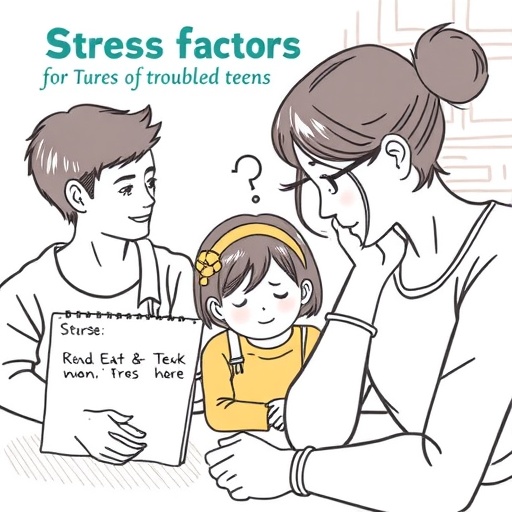In the realm of psychological research, an intriguing study has emerged, shedding light on the multifaceted stressors faced by parents of adolescents grappling with emotional and behavioral issues. The research, conducted by Bilgili-Karabacak, Settanni, Ivory, and colleagues, delves into the variables influencing the stress levels experienced by these caregivers. With an alarming rise in reported cases of emotional and behavioral problems among youth, understanding the parental perspective has never been more critical.
The study highlights that the mental health of adolescents is deeply intertwined with parental wellbeing. Parents often bear a significant emotional burden when their children exhibit challenging behaviors or emotional disturbances. This study captures the essence of their experiences, offering valuable insights into the stressors that contribute to their overall psychological state. The findings emphasize that it is not just the adolescent’s behavior but also the environmental and relational factors that amplify parental stress.
Researchers employed a comprehensive methodology to gather data, utilizing both quantitative and qualitative techniques. They surveyed a diverse group of parents, ensuring representation across various demographics. This multi-faceted approach allowed the researchers to gauge not only the levels of stress but also the underlying factors contributing to it. Parents reported feelings of isolation, frustration, and helplessness, all common emotions experienced when dealing with their children’s mental health challenges.
A key finding of the research indicates that the relationship dynamics within the family unit play a crucial role in shaping parental stress. Parents with supportive partners reported lower stress levels compared to those who felt isolated in their struggles. This highlights the importance of social support systems in mitigating the adverse effects of parenting adolescents with emotional and behavioral problems. Parents often need a strong network to lean on, underscoring the need for community resources that can provide emotional and practical support.
Additionally, the study points towards the impact of educational and economic factors on parental stress. Parents facing financial difficulties or inadequate educational resources for their children reported higher stress levels. This connection is vital as it suggests that addressing economic and educational disparities can significantly enhance the mental health landscape for families. Ensuring equitable access to resources can alleviate some burdens placed on parents, fostering a healthier environment for both the parents and their adolescents.
Among the psychological aspects explored, the concept of “anticipated grief” surfaced as a pivotal theme. Parents often worry about their children’s futures, fearing that emotional and behavioral issues might hinder their development and opportunities. This prevalent sentiment can lead to chronic stress, compelling parents to engage in constant vigilance concerning their children’s wellbeing. Thus, acknowledging these anticipatory worries is crucial for developing effective interventions.
Moreover, the study emphasizes the necessity for mental health education among parents. Many parents reported feeling unprepared to manage their children’s emotional and behavioral challenges, indicating a need for accessible resources and training. Workshops and informational sessions can empower parents, equipping them with the tools and knowledge to cope more effectively. Understanding the intricacies of emotional and behavioral problems can reshape how parents interact with their children, facilitating more constructive relationships.
As the research unfolds, it becomes apparent that cultural contexts also play a significant role in shaping parental stress levels. Different cultures have various approaches to mental health, which in turn affects how families cope with emotional and behavioral problems. The researchers suggest that culturally sensitive interventions should be developed to resonate with specific communities, ensuring the care provided is relevant and effective.
Furthermore, the study raises awareness about the stigma associated with mental health issues. Many parents reported feeling judged by others due to their children’s behaviors, which exacerbates their stress. Tackling stigma is crucial for fostering an environment where parents feel safe to seek help and support. Public awareness campaigns aimed at destigmatizing mental health challenges can be instrumental in changing perceptions, ultimately benefiting both parents and adolescents.
In exploring the implications of the findings, it becomes evident that there is a pressing need for policy changes. Advoc




